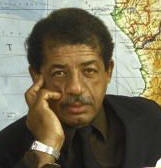
Martin Luther Kilson, a political scientist whose scholarly interests included African politics and the history of
African American intellectual life, entered graduate school at Harvard University in 1953, joined the faculty in 1962 and became a full tenured professor of government in 1969. He helped lay the foundation for collegiate black studies departments, which he sometimes criticised for a lack of academic rigour.
Almost two decades earlier, as an undergraduate at Pennsylvania’s Lincoln University, he met historian and activist WEB Du Bois, who was the first African American to receive a doctorate from Harvard. Kilson became one of Du Bois’ most prominent intellectual descendants and often highlighted the importance of an educated black elite – what Du Bois called the “Talented Tenth” – to promote African American cultural and social advancement.
By the mid-1960s, Kilson had helped found the Harvard-Radcliffe Association of African and Afro-American Students and was seeking to establish the study of African American life as a new field of academic inquiry.
He fostered what he called the “romantic notion … that Negroes share a culture” and “should care about each other,” he told the Harvard Crimson student newspaper in 1964.
“I suppose we’re looking for a new Negro identity, a psychological process, which has its roots in a broader Negro community,” he said. “The Negroes, like the Jews, want to say something and contribute to the American mainstream.”
In the late 1960s and early 1970s, Harvard and other universities recruited greater numbers of African American students and faculty members and set up departments of black studies. Kilson, who helped launch the field, soon grew disenchanted with the direction of some of those programmes.
He was concerned that academic standards were being lowered and he disparaged campus militants as “dilettantes jumping on the bandwagon and acting out all the trappings of something new and exciting”.
Kilson was especially disturbed by what he considered a trend towards self-separation and isolationism among black students at predominantly white colleges, arguing that they should engage with the wider academic world.
“I am opposed to proposals to make Afro-American studies into a platform for a particular ideological group,” he said in 1969, “and to restrict these studies to Negro students and teachers.”
In a controversial 1973 essay, Kilson argued that Harvard had admitted some unqualified black students and that the university’s black studies programme showed “slight concern for the academic standards that prevail at Harvard generally”.